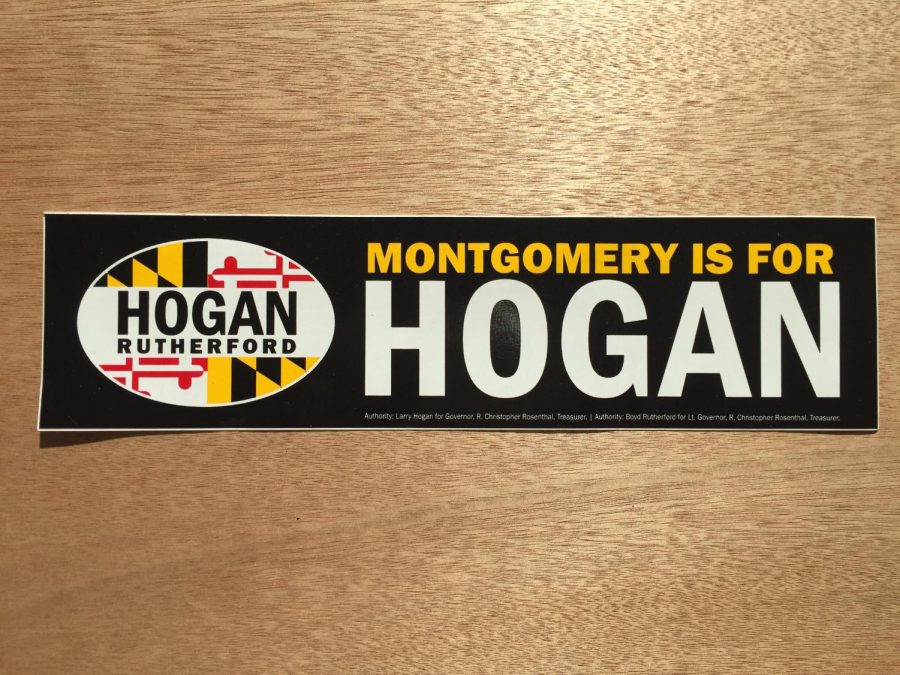Why I support Gov. Larry Hogan
Governor Hogan is running for re-election to a second term in office. Though registered Democrats in Maryland outnumber registered Republicans 2 to 1, polls show Hogan is widely popular.
November 4, 2018
This summer, I volunteered for Gov. Hogan’s (R) re-election campaign. The work itself was pretty standard—canvassing, surveys, an unfortunate wage of $0/hr—but the reactions I got… weren’t.
Although I’m not exactly thrilled to invite more judgmental looks over the issue, I’m writing about it because I think there’s a stereotype that needs combating. Around here, many people unconsciously (or consciously) believe that anyone who supports a Republican is somehow less moral, less educated or less thoughtful than Democratic volunteers. I had to be prepared to literally lose friends over my volunteer work.
The problem is, not only does this reflexive judgment entrench the extreme political animosity we all complain about, but it’s also plain old inaccurate. I don’t support Hogan because my morals aren’t sound; I just have a different decision calculus than the Jealous supporter next door—a different evaluation of which issues to prioritize, the importance of experience and the value of working across the aisle.
If you’re skeptical, read on! I can explain.
It’s hard to contest that Hogan has reliably delivered on his most important campaign promise: improving the economy. Maryland has gained tens of thousands of jobs since Hogan took office, and although much of that gain is due to nationwide economic growth, there are also indications of Maryland’s improvement relative to the nation. CNBC found that Maryland moved from 36th to 31st for best states for business over the past few years; the Baltimore Sun reported that our rate of job growth is faster than all but six other states.
Although many people don’t know this, he’s also been stellar on the environment, which shouldn’t be underappreciated in a state that depends on the Chesapeake Bay. Hogan spent billions on Bay Restoration Initiatives, publicly supported banning fracking and signed a bill requiring the state to cut greenhouse gas emissions 40 percent by 2030. He’s also been strong on combating opioid use, as demonstrated by his early creation of the opioid task force and $600 million allotted to prevention and treatment, as well as his calls for Congress to step up preventative measures.
I’ll freely admit that education is Hogan’s weak spot, but I think claims of him being anti-education are questionable, to say the least. Four years of record K-12 public education spending is nothing to scoff at; neither is his vocal support for making community college free for low and middle-income students, with a bill signed a few months ago backing up his word. As for the calendar shift, I’ll gladly take a three day shorter spring break if it means that people’s livelihoods in Ocean City are improved.
Most importantly, Hogan has reached across the aisle more than any politician I’ve seen. He compromised with the legislature to add more funding to Metro, worked with them to prevent healthcare costs from rising after Obamacare was endangered and backed gun control measures for school security. He’s also publicly disagreed with Trump several times and called back all of Maryland’s border resources in response to Trump’s child separation policy.
These efforts prove that his widespread endorsements—from dozens of Democrats, including the mayor of Gaithersburg, to the Washington Post Editorial Board—exist for a reason: he truly does govern from the middle. His support isn’t limited to public figures, either; 60 percent of Maryland’s likely Democratic voters approve of the job he’s done.
We may live in an era of hyper-partisanship, fraught relationships and zero sum games, but Hogan has shown Maryland that we don’t have to. As far as I’m concerned, support for Hogan is support for bipartisanship, and God knows we could use a little more of that.
I know that not everyone at Whitman will agree with me. But I hope you’ll give it a little thought—maybe even some substantial discussion—before automatically subscribing to your neighbor’s views on the gubernatorial race.
Because contrary to popular belief at Whitman, Hogan isn’t an enemy of our state. He’s the rare bipartisan, principled and civilized politician, which in politics today might as well be an endangered species. I don’t think we should let them go extinct.







